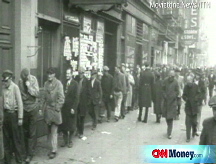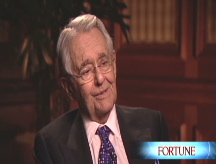A recession of biblical proportions
Consumers usually build savings in booms, then raid their troves during busts - but not this time.
(Fortune Magazine) -- Ever since Joseph decoded Pharaoh's dream about fat cows and thin ones and delivered his policy response - save in the fat years to survive in the lean times - consumers have followed that model.
In booms we put away some of the abundance because we know we'll need it in busts to come. Then, when the bad times hit, we spend some of what we've saved. But no more: Our recent bizarre behavior helps explain how we got into this economic mess. It may also hold clues to how we climb out of what will soon be the longest recession in 75 years.
For the first time since Genesis, consumers are doing everything backward. During the expansion from 2002 through 2007, our savings rate fell rather than rose. In mid-2005 it even went negative, and it mostly stayed below 1% until late last year. Then, as the recession really took hold, we again did the opposite: We increased our saving. As the economy shrinks, our savings rate has climbed to almost 3%.
That is the reverse of how consumers behaved in the Great Depression, for example. The personal savings rate declined after the 1929 market crash, and in the Depression's two worst years, 1932 and 1933, the rate went negative - we spent more than we earned. As the economy improved, our savings rate (the percentage of disposable income we save) was back up to 6% by 1937, but when the economy turned down in 1938, the rate dropped to 2%; the next year it rose. It was all a textbook illustration of logical consumer behavior.
This pattern that began with Pharaoh's dream moderates business cycles. It stabilizes the economy by damping down spending during expansions and fueling it during recessions. Today, however, we're in a bind. We really do need to save more, but to get out of the recession we also need to spend more, and we can't do both at the same time, especially with jobs disappearing in huge numbers. It's a double whammy: Not only do we lack savings to dig into and spend during this downturn, but we're also spending a smaller proportion of our incomes (which are themselves stagnating, so maybe it's a triple whammy). Put it all together, and it's clear why this recession is dragging on.
The central mystery: Why did we go into hock in the fat years? One argument is that we were behaving rationally. As our homes increased in value, they were doing our saving for us, so we didn't have to save out of current income. The trouble is that after home values turned down in mid-2006 and started making us poorer rather than richer, our savings rate kept right on falling.
Nor was our borrowing binge focused only on mortgages; we were going heavily into most other types of debt as well. In fact, we were spending record proportions of our incomes just to service our personal debt - even with interest rates near historical lows.
Maybe it was just a mania, focused not on tulip bulbs but on the simple joy of buying, reinforced by a belief that bad times were no longer inevitable. We hadn't seen a severe recession in 25 years; maybe we had advanced past such things. Or maybe some critical mass of people had never known real privation; if you've never missed a meal in your life, why would you worry about thin cows?
We can take several steps to move forward. In the near term we need spending, and that probably requires home-price stability - either government action to fend off foreclosures and spur buying, or the market bottoming on its own. Longer term we need saving, which could be encouraged in many ways. Washington could raise or remove the ceiling on tax-free IRA contributions. Companies can make 401(k) plans the default option for new employees rather than something they have to choose. Harvard Business School professor Peter Tufano advocates innovative ideas such as prize-linked savings vehicles, in which giant interest payments are awarded lottery-style; such programs have boosted savings for decades in other countries.
Whatever happens, don't expect miracles. Spending and saving behavior evolves slowly, and our current mess is in some ways the culmination of a long journey. We may not suddenly start behaving with biblical wisdom. But at least let's try not to forget how bad things can be when we get spending and saving backward. ![]()
-
 The retail giant tops the Fortune 500 for the second year in a row. Who else made the list? More
The retail giant tops the Fortune 500 for the second year in a row. Who else made the list? More -
 This group of companies is all about social networking to connect with their customers. More
This group of companies is all about social networking to connect with their customers. More -
 The fight over the cholesterol medication is keeping a generic version from hitting the market. More
The fight over the cholesterol medication is keeping a generic version from hitting the market. More -
 Bin Laden may be dead, but the terrorist group he led doesn't need his money. More
Bin Laden may be dead, but the terrorist group he led doesn't need his money. More -
 U.S. real estate might be a mess, but in other parts of the world, home prices are jumping. More
U.S. real estate might be a mess, but in other parts of the world, home prices are jumping. More -
 Libya's output is a fraction of global production, but it's crucial to the nation's economy. More
Libya's output is a fraction of global production, but it's crucial to the nation's economy. More -
 Once rates start to rise, things could get ugly fast for our neighbors to the north. More
Once rates start to rise, things could get ugly fast for our neighbors to the north. More









